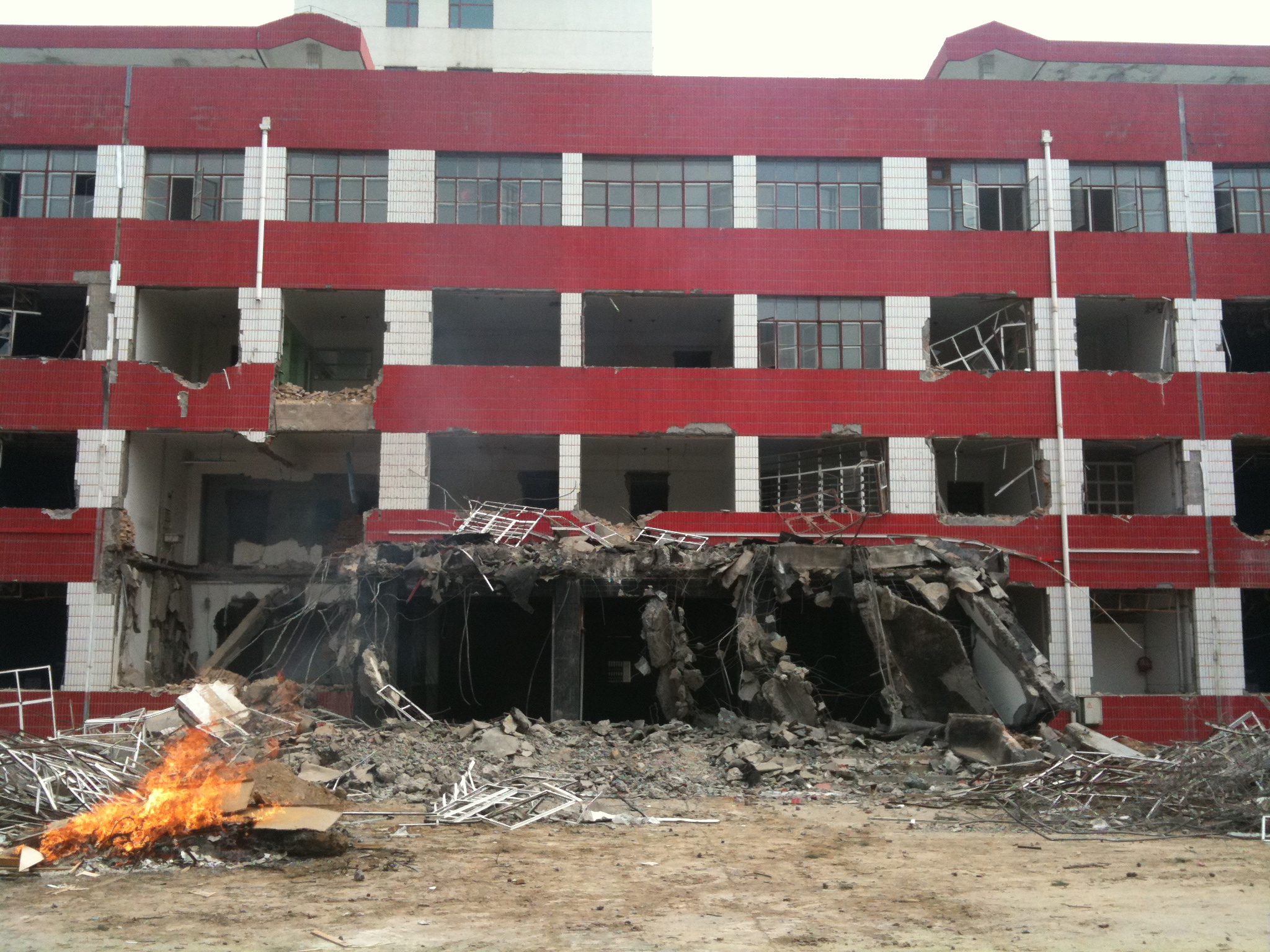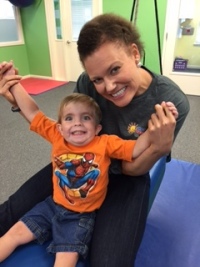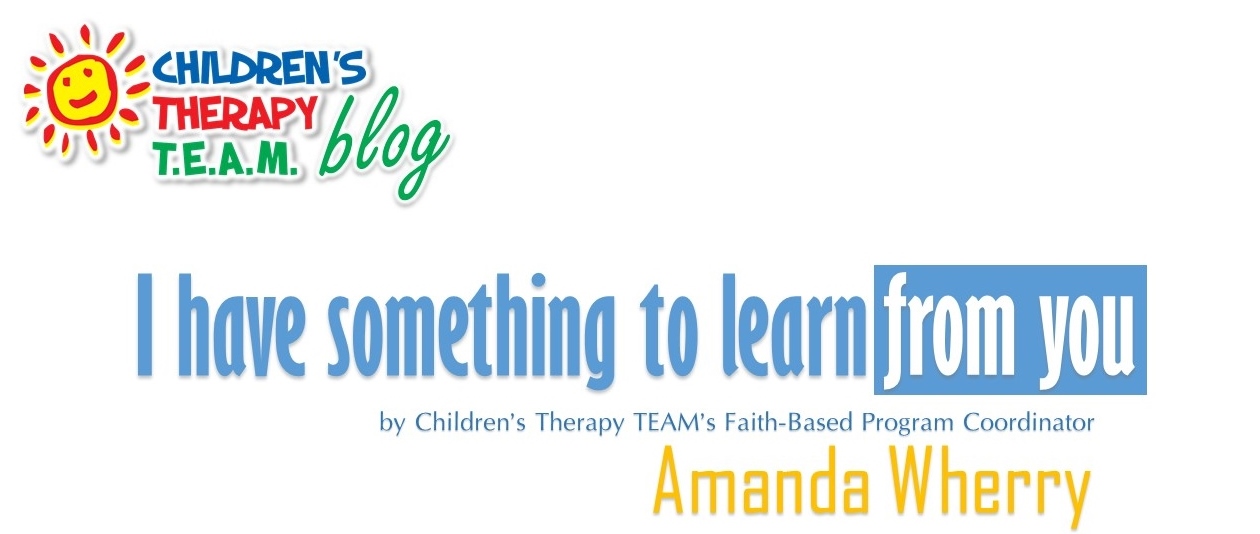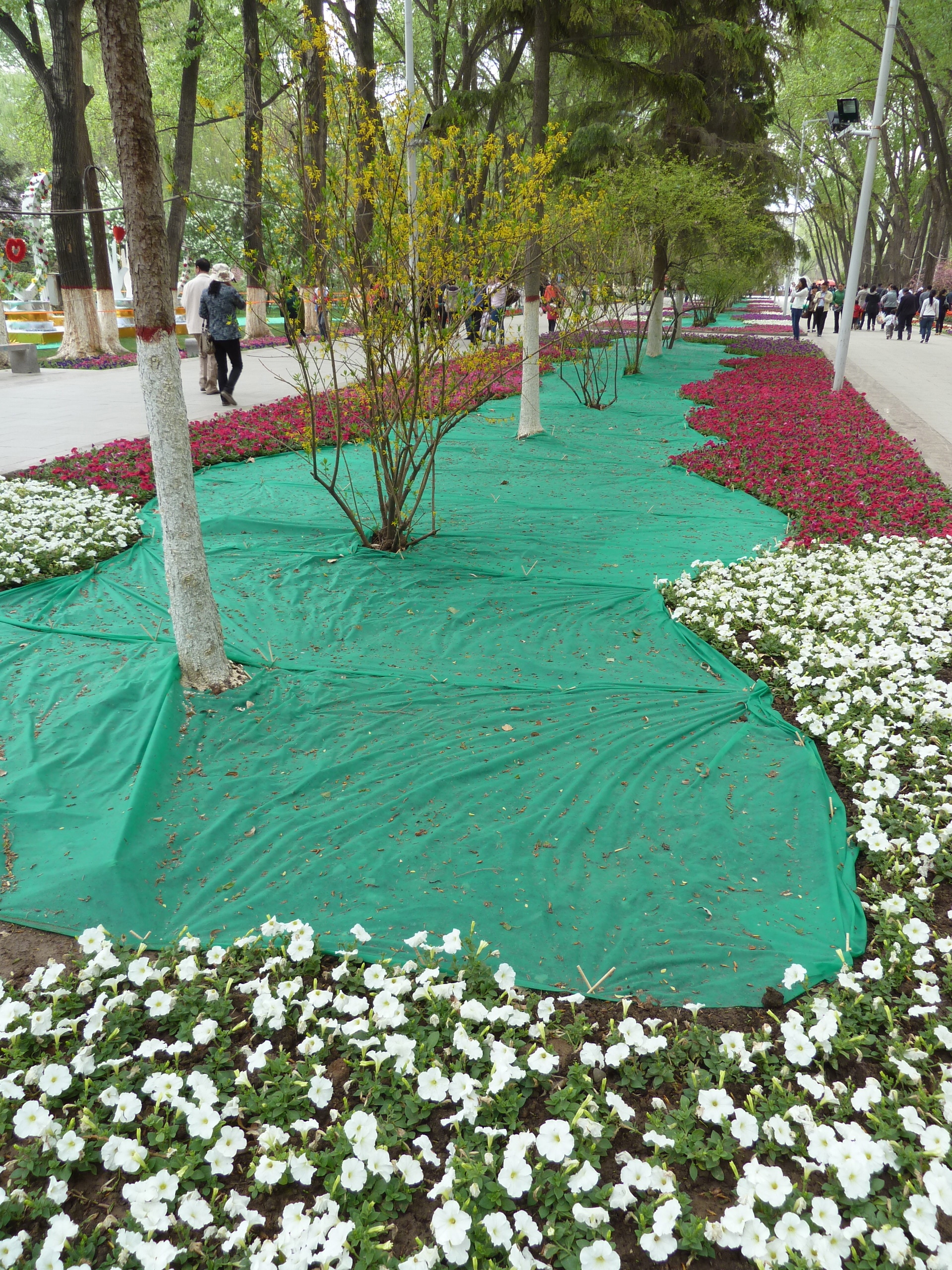When I first started my job in Central Asia, it wasn’t because I was proficient in the language. In fact, my language was pretty terrible. (I had just barely completed one semester of language study.) It wasn’t because I was a renowned expert. (I had worked in the States as an occupational therapist for just over two years before moving – certainly not enough time to feel completely confident and competent in my profession.) And it wasn’t because I was itching to dive into the insanity of paperwork required to get a work visa in the country where I lived. I don’t think anyone is crazy enough to actually enjoy filling out that many forms and finding that many government offices! Rather, I started working because there was a massive earthquake in the area – an earthquake that flattened an entire village. The city where I lived was inundated with earthquake victims – victims that needed surgeries and rehab and… occupational therapy. For weeks after this earthquake, most nights were filled with the sound of ambulances screaming their way through the chaotic 45-minute drive from the airport to the hospital.
 Shortly after the earthquake, while news reports continued to focus on victims who were still being found under mounds of rubble, and either tragic or miraculous stories consumed household dinner table conversations across the country, an employee at one of the local hospitals sent out a rather peculiar email. He wrote it solely to the expat community, specifically asking if there was an OT who would be willing to volunteer their time at the hospital to treat the earthquake victims and also train the local people how to do OT/PT. Since I was the only person who met that description, it seemed pretty clear that this was a setup from God. I’m a “doer” by nature. And I had started to grow a little restless, not having an outlet to work and truly dig in deep with the community. Language learning is obviously a necessary part of moving overseas, but unlike some expats, simply learning a language to learn a language did not fuel my soul. I love people. So I learned the language because my options were to either: 1) learn the language proficiently enough to make local friends; or 2) have no friends and therefore be forced to talk to walls. Crazy people talk to walls, so I chose option one and studied hard.
Shortly after the earthquake, while news reports continued to focus on victims who were still being found under mounds of rubble, and either tragic or miraculous stories consumed household dinner table conversations across the country, an employee at one of the local hospitals sent out a rather peculiar email. He wrote it solely to the expat community, specifically asking if there was an OT who would be willing to volunteer their time at the hospital to treat the earthquake victims and also train the local people how to do OT/PT. Since I was the only person who met that description, it seemed pretty clear that this was a setup from God. I’m a “doer” by nature. And I had started to grow a little restless, not having an outlet to work and truly dig in deep with the community. Language learning is obviously a necessary part of moving overseas, but unlike some expats, simply learning a language to learn a language did not fuel my soul. I love people. So I learned the language because my options were to either: 1) learn the language proficiently enough to make local friends; or 2) have no friends and therefore be forced to talk to walls. Crazy people talk to walls, so I chose option one and studied hard.
But I needed an outlet for my “doer-ness.” Although it seemed completely intimidating and moderately terrifying to begin working as a medical professional with medically critical cases while having only beginner level language skills, I started volunteering one morning a week. This wasn’t a huge chunk of time, but it was all I could manage while still being a full-time language student. Within a year, I went on staff full-time at the hospital, but it was that first year of volunteering that really helped me gain so many cultural experiences, greatly shaping how I would later serve that population as a therapist.
As I’ve mentioned, my language was my greatest barrier when I first started volunteering. Learning one of the hardest languages in the world for native English speakers was no small feat for me. And so, at the beginning, I obviously was a “student” at the hospital just as much as a “teacher.” I needed my local staff to teach me medical terminology, and they needed me to teach them therapy techniques. But what was just as important, if not even more important, was that I needed them to teach me the ways of their culture.
Cultural differences can make or break a relationship, and I’ve seen it “make” AND “break” many a friendship or marriage. Cultural differences can make your skin crawl. I will never enjoy walking into a store and have an employee non-stop holler the daily specials at me, using a poor quality microphone and crackly loudspeaker. I honestly think I have hearing damage because of my years overseas. Or I’ll never understand why the hospital did not have a rule that employees and patients could not smoke in the hallways, the stairwells, and in their rooms – especially while hooked up to oxygen. (In fact, I became a little bit famous for chasing people down and forcing them to put out their cigarettes. I constantly used the line, “If you blow up and kill me in the process, my mother will cry. And you do not want to make my mama cry!”) There were so many cultural differences and interesting experiences bombarding me on a daily basis.
- Once, while at work, I saw a hospital patient peeling a tomato with her teeth and placing the skins like a patchwork quilt all over her face. My coworkers thought it was maybe good for her skin.
- Every spring, workers would paint the tree trunks of every tree in the city white with a colored ring at the top. I asked dozens of people why paint the trees, but no two answers were the same.
- The hospital did not have air conditioning, and so there would be several weeks during the summer when the clothes under my white coat would be soaked through with sweat. But my staff refused to open a window while having the therapy room doors open at the same time because they claimed that the refreshing cross breeze would cause paralysis over half of their face.
- Women who had just given birth couldn’t brush their teeth, couldn’t take a shower, and couldn’t wash their hair… for weeks.
Cultural differences. Not necessarily wrong. Just different. (And sometimes completely scientifically incorrect… but fascinating nonetheless.)
In order to gain more and more understanding of the local culture, I became a constant question-asker. I took on the mindset of, “I have something to learn from you” – with the “you” being absolutely anyone in front of me. This meant laying down any sort of thoughts or opinions that I was the “foreign medical expert” or that I “knew better.” This sort of learner mindset was regularly challenged, however, and there were several incidences where I fumbled to know how to encourage my staff to perform evidence-based practice methods and to think outside of their culturally created box, while at the same time honoring the fact that I was living in their culture.
One such incident was when we received a patient with ALS – Lou Gehrig’s disease. He had technically been diagnosed approximately eight months before at a much larger hospital, in a much more technologically advanced city, but no one had told him his diagnosis. Not the doctors. Not his family members. No one. This was the way it was done in this culture. If the patient had a negative diagnosis or prognosis, they simply were never told. I worked with patients who didn’t know they had cancer but were taking “preventive chemo.” (There obviously is no such thing as “preventive chemo.” No one would put him or herself through chemo unless they actually had cancer. But this person did not know this.) I also worked with patients who had Parkinson’s disease, multiple sclerosis, and muscular dystrophy, but had never been told by their family and therefore had become depressed because they couldn’t understand why their symptoms kept getting worse and worse.
That was the case for this man with ALS. He was a successful businessman who had worked hard his whole life and had retired less than one month before beginning to show signs of ALS. He had spent a vast amount of his savings to see doctor after doctor, specialist after specialist, and try drug after drug. I’m assuming that each new place saw a copy of his medical files and knew his diagnosis, and yet no one told him that he was never going to recover the use of his legs. No one told him that, in fact, he would eventually die from this disease. Initially, my staff at the hospital began with this same cultural approach. He had come to our department because he had heard that a foreigner was working there and that physical therapy would be beneficial for him. When my staff told me his story, I was alarmed. In my opinion, this man needed to know that he was dying. He needed to be honored with the time he had remaining to put his affairs in order and say his goodbyes. His disease was moving swiftly, and within the short time frame that I saw him, he lost the use of his arms. But, my staff was afraid. They were afraid of breaking the cultural taboo and telling this man the truth of his diagnosis. I could have done it. I could have walked right up to him and announced, “You are dying. Stop wasting your money looking for different treatment or a cure and take care of your business.” But, that would have destroyed my relationship with my staff, and it would have lost their trust for forever. What I did, instead, was have a private meeting with my staff and ask that we brainstorm a solution together. I told them that I wanted to learn from them, learn about how to honor their cultural norms, while at the same time honoring the man in front of us. I asked them, if they were sick with this disease, would they want to know if they only had a short time to live? They all emphatically said yes, that they would want to take advantage of each and every day. By telling them that I both wanted and needed to be a learner within their culture, and by not attempting to “prove” to them that the way my culture would handle the situation was a better way, my staff was willing to brainstorm options with me. They eventually worked out the situation in a way that I never could have imagined. Another patient at the hospital was an old classmate of this man with ALS. In this culture, classmates bond together as close as family members. So, we told this man’s classmate, and he told the man about his diagnosis and prognosis. (Somehow, this wasn’t breaking any cultural taboos.) The man promptly left therapy and went to visit his children who lived on the other side of the country. I never saw him again.
“I have something to learn from you.” It’s such a valuable attitude. As a therapist I have something to learn from every single child that I see. From every parent. From every co-worker. As a daughter and a sibling, I have something to learn from my mom and dad or my sister, every time I see them. As a human, I have something to learn from the toothless lady who bagged my groceries last week, from that person in line in front of me at the bank, or from that girl who hoots and hollers and makes classes at the gym so much more fun. I can’t afford to not engage these strangers, because I have something to learn from them. I would be remiss to not meet my neighbors, because I have something to learn from them. By taking on the attitude of, “I have something to learn from you,” we not only honor that individual, but we remove the nagging need inside of us to try and “be seen” or “be noticed” or “be in control.” By believing that I have something to learn from every person around me, I can no longer excuse hiding out, remaining “safe,” or staying comfortable. If I say that I want to learn, and if I believe that you have something to teach me, then I must engage. And, I must engage with honor and humility.
Honor. My staff was trying to honor the man with ALS in the best way they knew how – according to their custom. But that custom was based on a lot of never-challenged fears. Honor is driving, motivating, intoxicating even (so is fear). And dishonor is one of the biggest wrecking balls out there. When I honor someone by approaching our conversation, our every interaction with the honest belief that, “I have something to learn from you,” it engages and disarms the other person. The weapons of differences in ideas and personalities are laid down, and the white flag of togetherness gets waved. But the killer of that white flag is the battle cry of trying to prove oneself or gain approval from anyone other than the Lord.
When I approach anyone, at any time, in an effort to prove myself, I have effectively taken my eyes off of honoring them and certainly have back-burnered any desire to learn from them. Rather, my focus is now on me. Fueled by insecurities, brokenness, comparison, or previous hurt or offense, I want to take control of the situation, take control of the person, or force them to take back what had been said. Control and dishonor is trying to prove my knowledge, my ability, my prowess, my street smarts, my worthiness, or my willingness. When I step into a conversation trying to prove, I don’t want to learn from, but rather I want to be learned from. I want to be the center. I want to be the focus. And I want to exalt myself and exert myself over the other person. Out of my own insecurities or because I have taken my gaze off of Jesus and forgotten, even for the briefest of moments, that He gives me identity (not what I do or what I know), I want the other person to feel small in their knowledge. If I’ve just taken a hit or I feel like my skills or abilities have been questioned, then, consciously or subconsciously, I start to want to prove my worth. I begin to seek approval from man instead of from Jesus. But trying to prove myself will only leave me worn out, frustrated, offended… or having worn out and hurt the other person.
What eases the tension of a conversation that has gotten a little heated? Believing that you have something to learn from that other person.
What creates an atmosphere of togetherness and team? Believing that you have something to learn from that other person.
What bonds together spouses and parents and children? Believing that you have something to learn from that other person (even if that other person is your child).
What engages communities and creates connectedness? What adds health to relationships? And what encourages honor and humility? Believing that you have something to learn from that other person.
I have something to learn from you. Therefore, I am thankful for you. I need you. If I will lay aside my pride and insecurities, then I can allow you to make me better, stronger, and wiser.
I have something to learn from you.
 Amanda Wherry serves as Children’s Therapy TEAM’s Faith-Based Program Coordinator. She is a local and international advocate for individuals with disabilities and their families. She spent nearly 7 years in a remote area in central Asia developing a hospital pediatric therapy program with teaching in physical, occupational and speech therapy as well as NICU therapy. read more
Amanda Wherry serves as Children’s Therapy TEAM’s Faith-Based Program Coordinator. She is a local and international advocate for individuals with disabilities and their families. She spent nearly 7 years in a remote area in central Asia developing a hospital pediatric therapy program with teaching in physical, occupational and speech therapy as well as NICU therapy. read more

